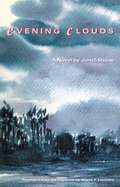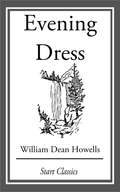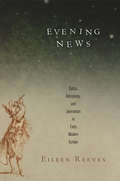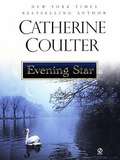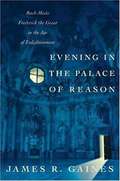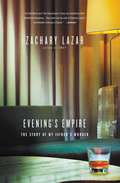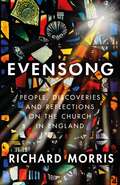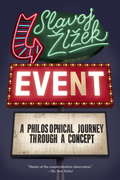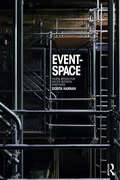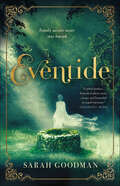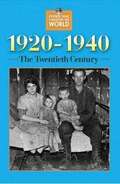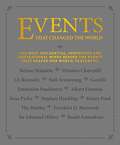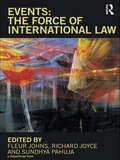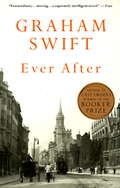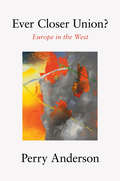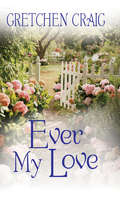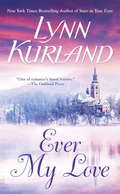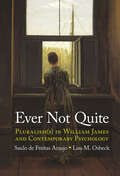- Table View
- List View
Evening Clouds
by Wayne P. Lammers Junzo ShonoA masterpiece of quiet lyricism set against a backdrop of change and renewal in suburban Tokyo "A delicate, sad novel that never admits to sadness."-The Atlantic"Junzo Shono, one of Japan's best kept literary secrets, challenges readers to rethink what constitutes a novel... Not unlike the trees, plants, flowers and vegetables that are so central to many of his images, Shono's style is alive and organic in the way it slithers, twists, and turns in an effort to capture the moment."-Persimmon
Evening Dress: Farce
by William Dean HowellsMrs. Edward Roberts: "Now, my dear, Amy and I will get there early, so as to make up for your coming a little late, but you must be there for the last half, at least. I would excuse you altogether if I could, for I know you must be dead tired, up all night, that way, on the train, but Mrs. Miller is one of those people who never can listen to reason, and she would take deadly offence if you missed her musicale, and wouldn't forgive us the longest day she lived. So you see?" Mrs. Roberts addresses herself to her husband in the library of their apartment in Hotel Bellingham, at Boston, as she stands before the fire pulling on a long glove and looking at him across his desk, where he has sunk into a weary heap in his swivel chair. "You are dreadfully used up, Edward, and I think it's cruel to make you go out; but what can I do? If it was anybody but Mrs. Miller I wouldn't think of having you go; I'm sure I never want to have her about, anyway. But that's just the kind of people that you're a perfect slave to! Now, dear, I've let the two girls go out, and you must remember that you're in the place alone with the children; but you needn't be troubled, because nobody will come after this hour till Willis does, and the girls will be back before that. Willis is to come and get you on his way to the Millers', and it's all been arranged for you, and you needn't think of a thing till Willis comes. You'll have to dress, of course; but you needn't begin that at once, and you can just sit here in your chair and rest." Mr. Roberts stretches his arms wildly abroad, and, throwing back his head, permits himself a yawn that eclipses his whole face. Mrs. Roberts lets both her arms fall at her side in token of extreme despair. "Edward! If you should go to sleep!"
Evening News
by Eileen ReevesEileen Reeves examines a web of connections between journalism, optics, and astronomy in early modern Europe, devoting particular attention to the ways in which a long-standing association of reportage with covert surveillance and astrological prediction was altered by the near simultaneous emergence of weekly newsheets, the invention of the Dutch telescope, and the appearance of Galileo Galilei's astronomical treatise, The Starry Messenger.Early modern news writers and consumers often understood journalistic texts in terms of recent developments in optics and astronomy, Reeves demonstrates, even as many of the first discussions of telescopic phenomena such as planetary satellites, lunar craters, sunspots, and comets were conditioned by accounts of current events. She charts how the deployment of particular technologies of vision--the telescope and the camera obscura--were adapted to comply with evolving notions of objectivity, censorship, and civic awareness. Detailing the differences between various types of printed and manuscript news and the importance of regional, national, and religious distinctions, Evening News emphasizes the ways in which information moved between high and low genres and across geographical and confessional boundaries in the first decades of the seventeenth century.
Evening Star (Star Quartet #1)
by Catherine CoulterFirst in the star quartet from the #1 New York Times bestselling author When Alex Saxton wins virgin Giana Van Cleve in the infamous Roman Flower Auction, he never expects to lose his heart...
Evening in the Palace of Reason
by James R. GainesFrederick The Great had a conflicted youth. His mother taught him to love art, luxury and intrigue. His father beat him mercilessly and often as he trained his son to be a dedicated leader and warrior. Bach knew and was fulfilled by his lifelong career as a brilliant composer and performer, though he often felt that he was underpaid and that the work he so loved wasn't appreciated. This historic novel illuminates the motives and goals of these major figures in the age of enlightenment. Fascinating and challenging facts about music and history abound. The novel is followed by a discography guiding the reader to J. S. Bach's recordings.
Evening's Empire: The Story of My Father's Murder
by Zachary LazarWhen he was just six years old, Zachary Lazar's father, Edward, was shot dead by hit men in a Phoenix, Arizona parking garage. The year was 1975, a time when, according to the Arizona Republic, "land-fraud artists roamed the state in sharp suits, gouging money from buyers and investors." How did his father fit into this world and how could his son ever truly understand the man, his time and place, and his motivations? In Evening's Empire, Zachary Lazar, whose novel Sway was named one of the Best Books of 2008 by Rolling Stone, the Los Angeles Times, and other publications, brilliantly attempts to reconstruct the sequence of events that led to his father's murder. How did Ed Lazar, a fun-loving but meticulous accountant, become involved in a multi-million dollar real-estate scandal involving politicians and Mafia figures? How much did he know about his colleagues' illegal activities? Why had he chosen to testify against his former business partner, Ned Warren, Sr.? Warren was "a mystery man," according to 60 Minutes, widely known as "the Godfather of land fraud." The day before Ed Lazar was scheduled to appear in front of a grand jury he was killed in a "gangland-style murder," as reported by Walter Cronkite on the CBS Evening News. Four hundred mourners attended a memorial service for him the next day. Evening's Empire is based on archival research and interviews--introducing a cast of characters as various as Senator Barry Goldwater and Cesar Romero--and is clarified by scenes imagined in the context of this evidence. It is a singular and haunting story of American ambition and its tragic cost. Of Zachary Lazar's previous book, Sway, the reviewer for The New York Times Book Review wrote, "This brilliant novel is about what's to be found in the shadows." The same can be said of Evening's Empire's true story, but here the shadows are very close to home.
Evensong: People, Discoveries and Reflections on the Church in England
by Richard MorrisParish churches have been at the heart of communities for more than a thousand years. But now, fewer than two in one hundred people regularly attend services in an Anglican church, and many have never been inside one. Since the idea of 'church' is its people, the buildings are becoming husks - staples of our landscapes, but without meaning or purpose. Some churches are finding vigorous community roles with which to carry on, but the institutional decline is widely seen as terminal.Yet for Richard Morris, post-war parsonages were the happy backdrop of his childhood. In Evensong he searches for what it was that drew his father and hundreds like him towards ordination as they came home from war in 1945. Along the way we meet all kinds of people - archbishops, chaplains, campaigners, bell-ringers, bureaucrats, archaeologists, gravediggers, architects, scroungers - and follow some of them to dark places.Part personal odyssey, part lyrical history, Evensong asks what churches stand for and what they can tell us; it explores why Anglicanism has often been fractious, and why it has become so diffuse. Spanning over two thousand years, it draws on new discoveries, reflects on the current state of the Church in England and ends amid the messy legacies of colonialism and empire.
Evensong: People, Discoveries and Reflections on the Church in England
by Richard MorrisParish churches have been at the heart of communities for more than a thousand years. But now, fewer than two in one hundred people regularly attend services in an Anglican church, and many have never been inside one. Since the idea of 'church' is its people, the buildings are becoming husks - staples of our landscapes, but without meaning or purpose. Some churches are finding vigorous community roles with which to carry on, but the institutional decline is widely seen as terminal.Yet for Richard Morris, post-war parsonages were the happy backdrop of his childhood. In Evensong he searches for what it was that drew his father and hundreds like him towards ordination as they came home from war in 1945. Along the way we meet all kinds of people - archbishops, chaplains, campaigners, bell-ringers, bureaucrats, archaeologists, gravediggers, architects, scroungers - and follow some of them to dark places.Part personal odyssey, part lyrical history, Evensong asks what churches stand for and what they can tell us; it explores why Anglicanism has often been fractious, and why it has become so diffuse. Spanning over two thousand years, it draws on new discoveries, reflects on the current state of the Church in England and ends amid the messy legacies of colonialism and empire.
Event
by Slavoj ZizekProbably the most famous living philosopher, Slavoj i ek explores the meaning of events in this short and digestible book An event can be an occurrence that shatters ordinary life, a radical political rupture, a transformation of reality, a religious belief, the rise of a new art form, or an intense experience such as falling in love. Taking us on a trip that stops at different definitions of event, i ek addresses fundamental questions such as: are all things connected? How much are we agents of our own fates? Which conditions must be met for us to perceive something as really existing? In a world that's constantly changing, is anything new really happening? Drawing on references from Plato to arthouse cinema, the Big Bang to Buddhism, Event is a journey into philosophy at its most exciting and elementary.From the Trade Paperback edition.
Event-Space: Theatre Architecture and the Historical Avant-Garde
by Dorita HannahAs the symbolists, constructivists and surrealists of the historical avant-garde began to abandon traditional theatre spaces and embrace the more contingent locations of the theatrical and political ‘event’, the built environment of a performance became not only part of the event, but an event in and of itself. Event-Space radically re-evaluates the avant garde’s championing of nonrepresentational spaces, drawing on the specific fields of performance studies and architectural studies to establish a theory of ‘performative architecture’. ‘Event’ was of immense significance to modernism’s revolutionary agenda, resisting realism and naturalism – and, simultaneously, the monumentality of architecture itself. Event-Space analyzes a number of spatiotemporal models central to that revolution, both illuminating the history of avant-garde performance and inspiring contemporary approaches to performance space.
Eventide
by Sarah GoodmanEventide is an evocative YA historical fantasy thriller by debut author Sarah Goodman, for fans of Jennifer Donnelly and Libba Bray.A BEA YA Buzz PickA SIBA Fall Okra PickA Once Upon a Book Club Subscription Box SelectionMADNESS, SECRETS, AND LIESWheeler, Arkansas, 1907When their father descends into madness after the death of their mother, Verity Pruitt and her little sister Lilah find themselves on an orphan train to rural Arkansas.In Wheeler, eleven-year-old Lilah is quickly adopted, but seventeen-year-old Verity is not. Desperate to stay close to her sister, Verity indentures herself as a farmhand. But even charming farm boy Abel Atchley can’t completely distract her from the sense that something is not quite right in this little town. Strange local superstitions abound, especially about the eerie old well at the center of the forest. The woods play tricks, unleashing heavy fog and bone-chilling cold…and sometimes visions of things that aren’t there. But for Verity, perhaps most unsettling of all is the revelation that her own parents have a scandalous history in this very town. And as she tries to unearth the past, sinister secrets come with it—secrets that someone will go to violent lengths to protect….A haunting tale of long-buried secrets, small-town scandal, and single-minded vengeance by talented debut novelist Sarah Goodman.At the Publisher's request, this title is being sold without Digital Rights Management Software (DRM) applied.
Events That Changed The World - 1920-1940 (Events That Changed The World Series)
by Sharon M. HimslRatification of the Nineteenth Amendment, first assembly of League of Nations (United States was absent), Mussolini's March on Rome, Lindbergh's transatlantic flight, Jazz Singer debut, Gandhi's "Salt March," Hitler's rise, stock market crash, and "Operation Dynamo" (rescue at Dunkirk) are among the events discussed, describing a highly transitional period that beigns with the aftermath of World War I and ends with the outbreak of World II.
Events that Changed the World: The most influential, innovative and inspirational minds behind the events that shaped our world
by AuthorThe 20th century began with a sense of great optimism. Extraordinary breakthroughs in science and invention promised the dawn of an exciting new world. Yet great developments in technology, travel and a shift in ideologies, made the 20th century one of the most violent and tumultuous in world history. And the most progressive. Including the sinking of the Titanic, and the invention of the first personal computer, Events that Changed the World explores the influences and the minds behind some of the last century's most significant events. Some have changed the way people think, others have changed the course of history and all have chronicled our past. Chapters: Culture and Society Humanity and Liberty Medicine Politics and War Science Space and the Environment Technology
Events that Changed the World: The most influential, innovative and inspirational minds behind the events that shaped our world
by PyramidThe 20th century began with a sense of great optimism. Extraordinary breakthroughs in science and invention promised the dawn of an exciting new world.Yet great developments in military technology, travel opportunities and a shift in ideologies and old rivalries, made the 20th century one of the most violent and tumultuos in world history. And the most progressive.From the sinking of the Titanic, to the release of the first personal computer, Events that Chapnged the World uncovers the people and minds - along with the influences - behind some of the last century's most significant events.Some have changed the way people think, others have changed the course of events across the globe - sometimes for the better, at other times with devastating results. All have chronicled our history.Chapters include:Culture and SocietyHumanity and LibertyMedicinePolitics and WarScienceSpace and the EnvironmentTechnology
Events: The Force Of International Law
by Fleur JohnsEvents: The Force of International Law presents an analysis of international law, centred upon those historical and recent events in which international law has exerted, or acquired, its force. From Spanish colonization and the Peace of Westphalia, through the release of Nelson Mandela and the Rwandan genocide, and to recent international trade negotiations and the 'torture memos', each chapter in this book focuses on a specific international legal event. Short and accessible to the non-specialist reader, these chapters consider what forces are put into play when international law is invoked, as it is so frequently today, by lawyers, laypeople, or leaders. At the same time, they also reflect on what is entailed in naming these ‘events’ of international law and how international law grapples with their disruptive potential. Engaging economic, military, cultural, political, philosophical and technical fields, Events: The Force of International Law will be of interest to international lawyers and scholars of international relations, legal history, diplomatic history, war and/or peace studies, and legal theory. It is also intended to be read and appreciated by anyone familiar with appeals to international law from the general media, and curious about the limits and possibilities occasioned, or the forces mobilised, by that appeal.
Ever After
by Graham SwiftDazzling in its structure and shattering in its emotional force, Graham Swift's Ever After spans two centuries and settings from the adulterous bedrooms of postwar Paris to the contemporary entanglements in the groves of academe. It is the story of Bill Unwin, a man haunted by the death of his beautify wife and a survivor himself of a recent brush with mortality. And although it touches on Darwin and dinosaurs, bees and bridge builders, the true subject of Ever After is nothing less than the eternal question, "Why should things matter?""Ever After is explicitly concerned with historical investigation, love, death, family affairs.... It moves quickly, and it vibrates with feeling and thought."--Wall Street Journal
Ever After (Cursed Series #1)
by Odessa Gillespie BlackIn order to fully inherit a millionaire's fortune, Allie Knowles must survive a month on her property--easier said than done when the enormous house is haunted by a violent ghost who claims to know Allie. But the true mystery lies with Cole Kinsley, the handsome groundskeeper. Cole and Allie have never met, though he's been driving her wild in her dreams for years. Yet now, every effort to get closer to him pushes him further away... Cole has only ever loved one soul and that love has endured for centuries. Now that soul rests within Allie's body and it takes everything in his power not to confess the truth. For her presence has put them both in mortal danger. Racing against the clock, Allie will have to break the ghost's curse--or history will be doomed to repeat itself.
Ever After: A Father's True Story
by William WhartonIn August of 1988, heavy black smoke engulfed an Oregon highway, causing a massive 23-car pileup that claimed the lives of novelist William Wharton's 36-year-old daughter, her husband, and their two infant daughters. They'd been victims of field burning, a routine agricultural practice, and were burned alive in their van.How could such a thing happen? And how could a father come to terms with such a loss? Ever After, Wharton's first memoir, is his search for answers to these questions, written with the inspired simplicity that won him great acclaim for his novels.
Ever Closer Union: An Introduction to European Integration
by Desmond DinanIn the five years since the third edition of Ever Closer Union was published, the EU has seen the ratification and implementation of the Lisbon Treaty, further enlargement, leadership changes, policy reforms, enduring Euroskepticism, an ever-growing global role, and more all of which is reflected in this fully revised and updated new edition. Unchanged, however, is the accessible, engaging nature of the text.
Ever Closer Union?: Europe in the West
by Perry AndersonA comprehensive, critical assessment of the EU after BrexitThe European Union is a political order of peculiar stamp and continental scope, its polity of 446 million the third largest on the planet, though with famously little purchase on the conduct of its representatives. Sixty years after the founding treaty, what sort of structure has crystallised, and does the promise of ever closer union still obtain?Against the self-image of the bloc, Perry Anderson poses the historical record of its assembly. He traces the wider arc of European history, from First World War to Eurozone crisis, the hegemony of Versailles to that of Maastricht, and casts the work of the EU&’s leading contemporary analysts – both independent critics and court philosophers – in older traditions of political thought. Are there likenesses to the age of Metternich, lessons in statecraft from that of Machiavelli?An excursus on the UK&’s jarring departure from the Union considers the responses it has met with inside the country&’s intelligentsia, from the contrite to the incandescent. How do Brussels and Westminster compare as constitutional forms? Differently put, which could be said to be worse?
Ever Faithful: A Vintage National Parks Novel
by Karen BarnettVibrant historic Yellowstone National Park comes to life in this romantic mystery about a man hiding the truth, braving the west to become something more--and the woman who must confront his deception.A man who can't read will never amount to anything--or so Nate Webber believes. But he takes a chance to help his family by signing up for the new Civilian Conservation Corps, skirting the truth about certain "requirements." Nate exchanges the harsh Brooklyn streets for the wilds of Yellowstone National Park, curious if the Eden-like wonderland can transform him as well. Elsie Brookes was proud to grow up as a ranger's daughter, but she longs for a future of her own. After four years serving as a maid in the park's hotels, she still hasn't saved enough money for her college tuition. A second job, teaching a crowd of rowdy men in the CCC camp, might be the answer, but when Elsie discovers Nate's secret, it puts his job as camp foreman in jeopardy. Tutoring leads to friendship and romance, until a string of suspicious fires casts a dark shadow over their relationship. Can they find answers before all of their dreams go up in smoke?
Ever Faithful: Race, Loyalty, and the Ends of Empire in Spanish Cuba
by David SartoriusKnown for much of the nineteenth century as "the ever-faithful isle," Cuba did not earn its independence from Spain until 1898, long after most American colonies had achieved emancipation from European rule. In this groundbreaking history, David Sartorius explores the relationship between political allegiance and race in nineteenth-century Cuba. Challenging assumptions that loyalty to the Spanish empire was the exclusive province of the white Cuban elite, he examines the free and enslaved people of African descent who actively supported colonialism. By claiming loyalty, many black and mulatto Cubans attained some degree of social mobility, legal freedom, and political inclusion in a world where hierarchy and inequality were the fundamental lineaments of colonial subjectivity. Sartorius explores Cuba's battlefields, plantations, and meeting halls to consider the goals and limits of loyalty. In the process, he makes a bold call for fresh perspectives on imperial ideologies of race and on the rich political history of the African diaspora.
Ever My Love
by Gretchen CraigOn the eve of Civil War, the daughter of Southern planters finds her loyalties tested in a magnificent saga of family pride and forbidden love. . . Brought up amid the luxury of plantation life, Marianne Johnston never questions her sheltered life until, driven by her conscience, she joins the Underground Railroad. Soon Marianne is living a dangerous double life, helping slaves flee by night and acting the belle by day. And nothing is riskier than her attraction to wild, heartless young Southerner Yves Chamard--while being courted by his noble older brother. Now Marianne is desperately trying to resist Yvess seduction, knowing that her surrender to his touch may cost her everything. . . Gretchen Craig returns with another sweeping story that brings the Old South to life in all its glory--and a passionate heroine compelled to follow her heart. . . "[A] sweeping debut. . . vivid. . . wonderful. . . a testament to the people of New Orleans, yesterday and today. " --Romantic Times, 4 stars on Always and Forever Outstanding Praise For Gretchen Craigs First Novel Always And Forever "Craigs sweeping debut brings you straight into her characters lives, and her vivid descriptions and historical details allow you to fully experience the story of two remarkable women. Not only is this a wonderful portrait of the Old South, its a testament to the people of New Orleans, yesterday and today. "--Romantic Times, 4 stars "Craigs characters tugged at my heart. " --Jodi Thomas, USA TODAY bestselling author
Ever My Love
by Lynn KurlandTwo people are caught up in love—and in time—in the latest novel from the New York Times bestselling author of Stars in Your Eyes. In search of a fresh start, Emma Baxter has traveled to Scotland to try to forget her rocky love life. Luckily, the gorgeous Highlander who owns the house up the path from her rental cottage might be exactly the kind of distraction she needs. But there’s more to his intriguing qualities than she can explain—although she certainly isn’t buying into the local legends of Highland magic. Nathaniel MacLeod is a man adrift, all thanks to the unwanted gift that forces him to continually jump between centuries. He never knows if he’ll wind up in the present day or the fourteenth century, but when Emma follows him back through time, he suddenly has more to worry about than keeping his separate lives straight... Someone has started to notice Nathaniel’s travels and now, no time period is safe, for him or for Emma.From the Paperback edition.
Ever Not Quite: Pluralism(s) in William James and Contemporary Psychology
by Lisa M. Osbeck Saulo de AraujoWilliam James made many references to pluralism throughout his career. Interestingly, many contemporary psychologists also discuss pluralism and indeed call for pluralism as a corrective to the discipline's philosophical and methodological foundations. Yet, pluralism and the purposes to which it is applied are understood in a variety of ways, and the relation of contemporary pluralism to the pluralism(s) of William James is uncertain. This book offers conceptual clarification in both contexts, first distinguishing diverse senses of pluralism in psychology and then systematically examining different forms of pluralism across the writings of James. A comparison of meanings and analysis of implications follows, aimed at illuminating what is at stake in ongoing calls for pluralism in psychology.
